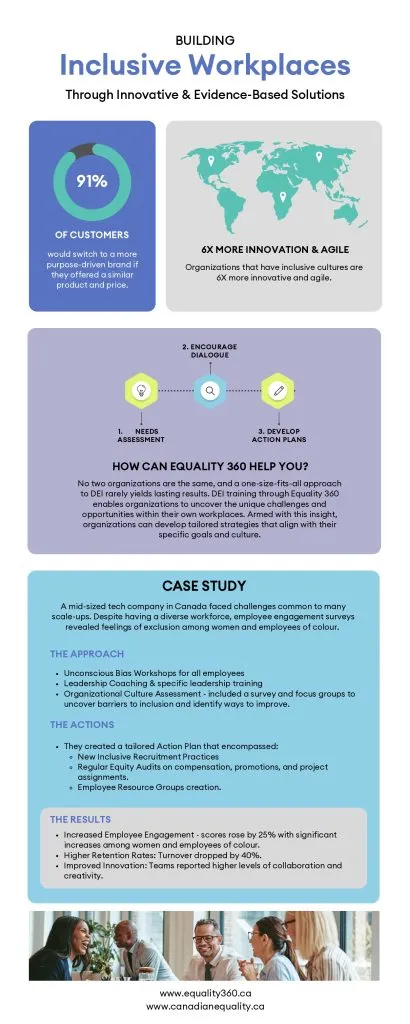
Building Inclusive Workplaces Through Innovative Equity Solutions
Creating inclusive workplaces is no longer just a social imperative—it’s a business advantage. Diversity, equity, and inclusion (DEI) initiatives have proven to enhance creativity, foster innovation, and improve employee satisfaction. However, achieving true inclusivity requires more than good intentions; it demands strategic, innovative equity solutions. This blog explores the transformative power of DEI efforts through training, tailored strategies, and certifications, concluding with a real-world case study of cultural transformation through equity.
The Importance of DEI Training for Workplace Transformation
DEI training serves as the foundation for creating inclusive workplaces. It goes beyond raising awareness to actively equipping employees and leaders with the tools to address unconscious bias, navigate cultural differences, and foster a culture of respect. By increasing understanding and empathy, organizations can create an environment where all employees feel valued and supported.
In a workplace where individuals understand the systemic challenges faced by marginalized groups, decision-making improves, and collaboration thrives. DEI training also empowers teams to challenge the status quo and develop solutions to inequalities that may have been previously overlooked.
When leaders commit to these training programs, they signal to employees that inclusion is a priority. This commitment lays the groundwork for building an equitable workplace where differences are celebrated, not sidelined.
How Training Can Help Build Tailored DEI Strategies in the Workplace
No two organizations are the same, and a one-size-fits-all approach to DEI rarely yields lasting results. DEI training enables organizations to uncover the unique challenges and opportunities within their own workplaces. Armed with this insight, organizations can develop tailored strategies that align with their specific goals and culture.
For instance, a comprehensive DEI training program may involve:
- Conducting Needs Assessments: Training often starts with evaluating current policies, identifying gaps, and understanding employee perceptions of inclusivity.
- Encouraging Dialogue: Workshops and facilitated discussions help uncover barriers to inclusion that may not be immediately apparent.
- Developing Action Plans: Training sessions can include exercises that help teams map out achievable, measurable goals for creating equity.
By integrating DEI principles into everyday practices—such as recruitment, promotions, and team-building activities—organizations can ensure that inclusivity becomes ingrained in their workplace culture.

Exploring the Importance of DEI Courses and Certifications
DEI courses and certifications are another powerful tool for fostering equity in the workplace. They provide participants with specialized knowledge and practical strategies to address systemic inequities, both in their organizations and beyond.
Why Pursue DEI Certifications?
- Building Expertise: Certification programs offer a deep dive into issues like intersectionality, systemic bias, and inclusive leadership, equipping participants with expertise that drives meaningful change.
- Professional Credibility: Holding a DEI certification demonstrates a serious commitment to equity and positions individuals as advocates for inclusivity within their organizations.
- Driving Innovation: Certified professionals are often trained to think creatively about solving equity challenges, leading to innovative solutions that benefit their teams.
For organizations, supporting employees in obtaining DEI certifications can build internal capacity for fostering equity. A workforce equipped with these skills can identify hidden barriers, reimagine systems, and advocate for inclusivity at all levels of the organization.
Case Study: How an Organization Transformed Their Culture by Embracing Equity
Background
A mid-sized technology firm faced challenges common to many growing companies. Despite having a diverse workforce, employee engagement surveys revealed feelings of exclusion among underrepresented groups, such as women and employees of color. Leadership recognized the urgent need to address these issues and create a workplace where everyone could thrive.
The Approach
The company partnered with external DEI experts to develop an equity-focused transformation strategy. The process began with a company-wide DEI training program, which included:
- Unconscious Bias Workshops: Employees at all levels explored how unconscious biases influenced decision-making in hiring, promotions, and daily interactions.
- Leadership Coaching: Managers received specialized training on inclusive leadership, learning how to advocate for equity and empower their teams.
- Cultural Assessments: The consultancy conducted surveys and focus groups to uncover barriers to inclusion and identify areas for improvement.
Armed with this insight, the organization worked to create a tailored DEI strategy. Key initiatives included:
- Inclusive Recruitment Practices: They restructured their hiring process to include blind résumé reviews and diverse interview panels.
- Equity Audits: Leadership evaluated compensation, promotions, and project assignments to ensure fair treatment across all groups.
- Employee Resource Groups (ERGs): The company supported the formation of ERGs to give underrepresented employees a platform to voice their needs and connect with allies.
The Results
Within two years, they saw dramatic improvements:
- Increased Employee Engagement: Engagement scores rose by 25%, with significant increases among women and employees of color.
- Higher Retention Rates: Turnover among underrepresented employees dropped by 40%, reflecting a more inclusive culture.
- Improved Innovation: Teams reported higher levels of collaboration and creativity, leading to the development of several successful new products.
The organization’s commitment to equity not only transformed its culture but also enhanced its reputation as an employer of choice in the tech industry.
Conclusion
Building inclusive workplaces through innovative equity solutions is not a one-time effort; it’s an ongoing commitment to transformation. By investing in DEI training, developing tailored strategies, and supporting certifications, organizations can foster equity at every level. The results are clear: inclusive workplaces drive engagement, innovation, and success.
The journey to equity may require effort, but it starts with a single step—taking action. Whether it’s enrolling in a DEI course, auditing current policies, or initiating candid conversations, every initiative contributes to a more equitable and inclusive workplace.
Let us all strive to be the change-makers our workplaces and communities need.

